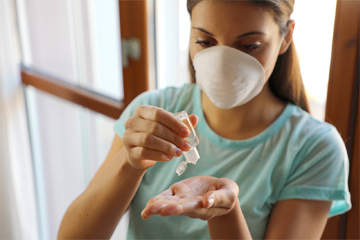 COVID-19, the new coronavirus disease that was first identified in Wuhan, China was declared as a global emergency on January 31, 2020 and announced as a pandemic on March 11,2020 by the World Health Organization (WHO). With a total of 1629 confirmed cases of Covid-19 and 41 deaths from the virus reported in the United States alone, this outbreak is quickly spreading to all parts of the world. But since no vaccines are currently available to prevent coronavirus disease, the best way to prevent illness is to avoid being exposed to this virus. Along with following the basic preventive measures like hand-washing and sanitizing surfaces, people now also tend to wear face mask thinking it will prevent the virus from entering the body. But that’s not true!
COVID-19, the new coronavirus disease that was first identified in Wuhan, China was declared as a global emergency on January 31, 2020 and announced as a pandemic on March 11,2020 by the World Health Organization (WHO). With a total of 1629 confirmed cases of Covid-19 and 41 deaths from the virus reported in the United States alone, this outbreak is quickly spreading to all parts of the world. But since no vaccines are currently available to prevent coronavirus disease, the best way to prevent illness is to avoid being exposed to this virus. Along with following the basic preventive measures like hand-washing and sanitizing surfaces, people now also tend to wear face mask thinking it will prevent the virus from entering the body. But that’s not true!
Experts warn that face masks won’t help most people avoid the virus – on the other hand, they may actually increase the risk of getting it. According to a blog in TIME, a professor of medicine in the division of infectious diseases at Vanderbilt University says that it seems kind of intuitively obvious that if you put something-whether it’s a scarf or a mask-in front of your nose and mouth, that will filter out some of these viruses that are floating around out there. However, it’s not effective against respiratory illnesses like the flu and COVID-19. The Centers for Disease Control and Prevention (CDC), says that surgical masks won’t stop the wearer from inhaling small airborne particles, which can cause infection nor do these masks form a tight seal around the face.
The CDC recommends wearing a surgical face mask only
- For people who already show symptoms of coronavirus and must go outside (because, wearing a mask can help prevent spreading the virus by protecting others nearby when you cough or sneeze).
- For caregivers of people infected with the virus
- For people who enter a healthcare provider’s office
People out of fear of coronavirus buy face masks in bulk, which has led to a shortage of masks for medical personnel coping with the epidemic, who really do need them. There’s no need for healthy people to go around wearing face masks to protect themselves from the novel coronavirus. Moreover, according to CBSNEWS, experts caution that putting on a face mask without proper fitting and training could actually increase your risk. Because, people who aren’t trained in how to use a face mask tend to touch their faces a lot, which could increase their chances of becoming infected with the coronavirus.
The WHO emphasizes that if you’re going to use a mask, it’s important to know when and how to use it correctly.
When to Use a Mask
Follow CDC’s recommendations for wearing face mask and along with it follow these tips too:
- If you are healthy, you only need to wear a mask if you are taking care of a person with suspected 2019-nCoV infection.
- Wear a mask if you are coughing or sneezing.
- For effective prevention, along with wearing masks, one has to practice frequent hand-cleaning with alcohol-based hand rub or soap and water.
- Most importantly, if you wear a mask, then you must know how to use it and dispose of it properly.
How to Use a Mask – Wear it, Take off & Dispose
- Before wearing a mask, clean your hands with alcohol-based hand sanitizer/rub or soap and water.
- Cover your mouth and nose with the Make sure there are no gaps between your face and the mask.
- Avoid touching the mask while using it.
- If you do touch the masks, then clean your hands with alcohol-based hand rub or soap and water.
- Replace the mask with a new one as soon as it is damp and do not re-use single-use masks.
- And while removing the masks, make sure you don’t touch the mask from front, instead, remove it from behind and discard immediately in a closed bin.
- Soon after,clean your hands with alcohol-based hand rub or soap and water.
Experts say washing your hands frequently and thorough lyis the best way to prevent the spread of infectious illnesses like coronavirus because one of the most common ways infections spread is when people touch a contaminated surface and then touch their mouth or nose(cbsnews.com). Also, avoid touching your eyes, nose and mouth with unwashed hands, avoid contact with sick people, cover your mouth when you cough and sneeze, and disinfect objects and surfaces frequently.